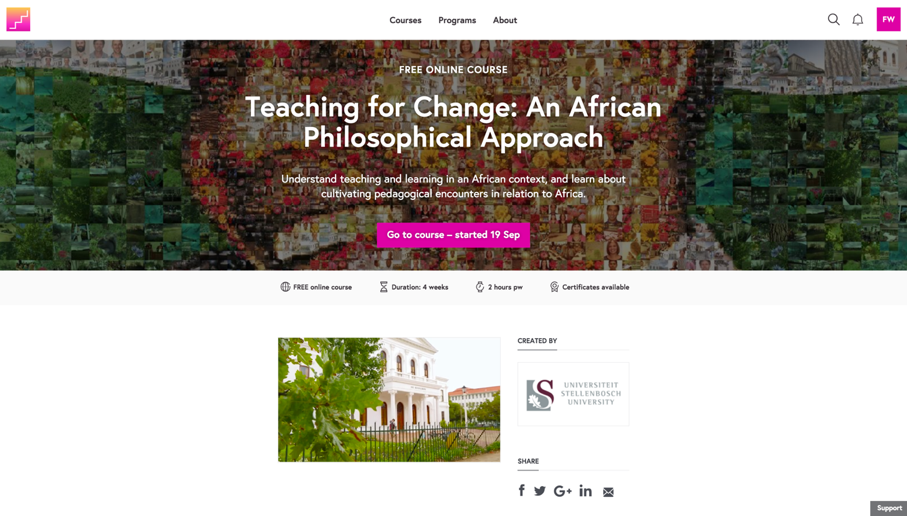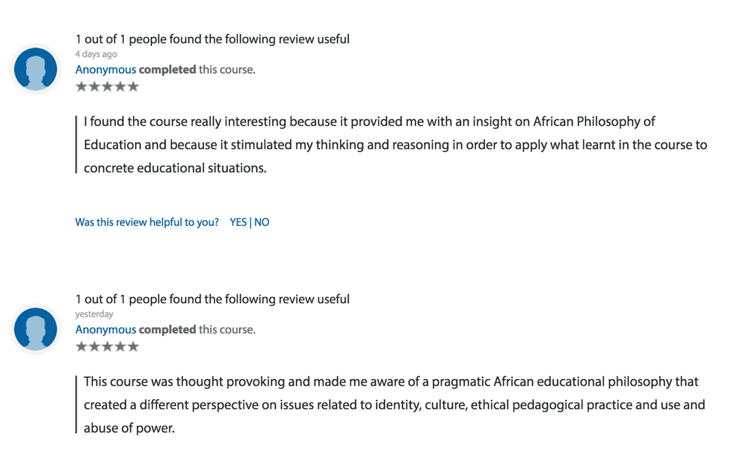* Let wel: Hierdie blad is slegs in Engels beskikbaar.

Stellenbosch University implemented its first MOOC (Massive Open Online Course), Teaching for Change: An African Philosophical Approach on the British based MOOC platform, FutureLearn. FutureLearn enrolling approximately 5 million users prides itself as being the world's premier social learning platform. Testimony to this are their high completion rates and high concurrent active users.
Teaching for Change, presented by Professor Yusef Waghid, was the first philosophy of education MOOC on FutureLearn and also the first African philosophy of education MOOC of its kind in the world. Teaching for Change can be considered as a decolonised curriculum development initiative aimed at situating African life experiences at the centre of teaching and learning. In the main, decolonising the curriculum is primarily about establishing conditions for learning that breaks with transmission modes of learning, and the hegemonic culturation of knowledges whereby only Eurocentric and Anglo Saxon knowledges are considered as dominant educational discourses. Teaching for Change is aimed at cultivating an openness to learn, and an attenuation of a reflective openness to the known and unimagined – that is, what is not yet. According to FutureLearn, niche courses such as Teaching for Change are characterised by vibrant discussions. This was evident in the Teaching for Change course with over 13000 steps completed and over 2500 comments posted on the platform over a 4-week period. These comments were posted by the over 2600 enrollees from all over the world, as can be seen from the demographic illustration below.

 Figure 1. Teaching for Change demographics, darker indicates more users.
Figure 1. Teaching for Change demographics, darker indicates more users.
The Centre for Learning Technologies MOOC instructional design team devised a case study approach for Teaching for Change, through which various philosophies were applied to real world contexts endemic to the African content. Case studies related to that of the 2015 student protests, terrorism, military dictatorships, food (in)security and the Truth and Reconciliation Commission (TRC) hearings of post 1994. Due to the current topical nature of these case studies, there were rich and vibrant discussions emanating throughout the duration of the course, with an average user number of 917 students per day. As FutureLearn prides itself in being the premier social learning platform, Teaching for Change was specifically designed so that not only the presenter would support students' learning, but also that students would support one another's learning. This was evident through students sharing their own cultural perspectives as they engaged with one another.



Figure 2. Teaching for Change was specifically designed to encourage learners to share the own cultural perspectives and so that learners could support each other in a four-week journey.
 Figure 3. A sample of the rich multimedia user experience on Teaching for Change.
Figure 3. A sample of the rich multimedia user experience on Teaching for Change.
Although the course is now completed, many of the 2500 students are still engaging on the platform. Some students who have already completed the course have already posted review scores on the website Class Central, which is a MOOC aggregator site listing all the top MOOCs in the world. To date Teaching for Change has an average user rating of between 4-5 and 5 out of 5. Attached below are some of the reviews already posted.





In conclusion, Stellenbosch University's first MOOC can be deemed a success. Not only was Stellenbosch University able to showcase one of its research strengths amongst other leading institutions as a full partner of FutureLearn, but it was also able to contribute to the world's knowledge economy in a distinctly African way. The MOOC has also generated much positive exposure through numerous publications and radio interviews that were conducted. The course presenter has been diligently engaged with students and aptly responded to all students' comments via written texts and podcasts. The latter is a vindication of Professor Waghid's conscientious commitment towards cultivating, in his words, 'a reflexively open understanding of African knowledge through a philosophy of education that is also reflexively open to the new – that is, what remains in becoming/potentiality'.

Figure 4. A few of the partner universities listed on the FutureLearn.

